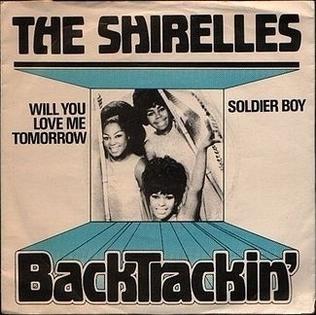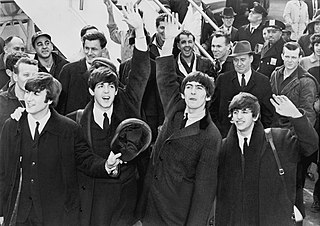
"From Me to You" is a song by the English rock band the Beatles that was released in April 1963 as their third single. It was written by Paul McCartney and John Lennon. The song was the Beatles' first number 1 hit on what became the official UK singles chart but the second, after "Please Please Me", on most of the other singles charts published in the UK at the time. "From Me to You" failed to make an impact in the United States at the time of its initial release. Instead, a 1963 cover version released by Del Shannon resulted in the song's becoming the first Lennon–McCartney track to enter the US pop charts. The Beatles' original was rereleased in the US in January 1964 as the B-side to "Please Please Me", and reached number 41.

Robert Thomas Velline, known professionally as Bobby Vee, was an American singer who was a teen idol in the early 1960s and also appeared in films. According to Billboard magazine, he had thirty-eight Hot 100 chart hits, ten of which reached the Top 20. He had six gold singles in his career.

Introducing... The Beatles is the first studio album released by the English rock band the Beatles in the United States. Originally scheduled for a July 1963 release, the LP came out on 10 January 1964, on Vee-Jay Records, ten days before Capitol's Meet the Beatles!. The latter album, however, entered the U.S. album chart one week before the former. Consequently, when Meet The Beatles! peaked at No. 1 for eleven consecutive weeks, Introducing...The Beatles stalled at No. 2 where it remained for nine consecutive weeks. It was the subject of much legal wrangling, but ultimately, Vee-Jay was permitted to sell the album until late 1964, by which time it had sold more than 1.3 million copies. On 24 July 2014 the album was certified gold and platinum by the RIAA.

"Please Please Me" is a song released by the English rock band the Beatles. It was their second single in the United Kingdom, and their first in the United States. It is also the title track of their first LP, which was recorded to capitalise on the success of the single. It is a John Lennon composition, although its ultimate form was significantly influenced by producer George Martin.

"Do You Want to Know a Secret" is a song by English rock band the Beatles from their 1963 album Please Please Me, sung by George Harrison. In the United States, it was the first top ten song to feature Harrison as a lead singer, reaching No. 2 on the Billboard chart in 1964 as a single released by Vee-Jay, VJ 587. In the UK, Billy J. Kramer released a cover of the song as his debut single, reaching No. 1 on the NME singles chart and No. 2 on the Record Retailer chart.

"Will You Love Me Tomorrow", sometimes known as "Will You Still Love Me Tomorrow", is a song with words by Gerry Goffin and music composed by Carole King. It was recorded in 1960 by the Shirelles at Bell Sound Studios in New York City, and hit number one on the Billboard Hot 100 chart. The song was the first by an African-American all-girl group to reach number one in the United States. It has since been recorded by many other artists including a 1971 version by co-writer Carole King.

"Take Good Care of My Baby" is a song written by Carole King and Gerry Goffin. The song was made famous by Bobby Vee, when it was released in 1961.

"Rhythm of the Rain" is a song performed by The Cascades, released in November 1962. It was written by Cascades band member John Claude Gummoe. On March 9, 1963, it rose to number 3 on the Billboard Hot 100, and spent two weeks at number 1 on Billboard's Easy Listening chart. Billboard ranked the record as the number 4 song of 1963.
"I'm Sorry" is a 1960 hit song by 15-year-old American singer Brenda Lee. The song was written by Dub Allbritten and Ronnie Self. It peaked at No. 1 on the Billboard Hot 100 singles chart in July 1960. On the UK Singles Chart, the song peaked at No.12. AllMusic guide wrote that it is the pop star's "definitive song", and one of the "finest teen pop songs of its era". In 1999, the 1960 recording by Lee on Decca Records was inducted into the Grammy Hall of Fame.
The Wonder Who? was a nom de disque of The Four Seasons for four single records released from 1965 to 1967. It was one of a handful of "names" used by the group at that time, including Frankie Valli and The Valli Boys. Wonder Who? recordings generally feature the falsetto singing by Valli, but with a softer falsetto than on "typical" Four Seasons recordings.

"The Night Has a Thousand Eyes" is a song written by Benjamin Weisman, Dorothy Wayne, and Marilyn Garrett. It became a popular hit in 1962 for Bobby Vee and has had several cover versions over the years.

The Beatles experienced huge popularity on the British record charts in early 1963, but record companies in the United States did not immediately follow up with releases of their own, and the Beatles' commercial success in the US continued to be hampered by other obstacles, including issues with royalties and public derision toward the "Beatle haircut".

"It Might as Well Rain Until September" is a 1962 song originally written for Bobby Vee by Carole King and Gerry Goffin. King recorded the demo version of the song and it became a hit for her. However, Vee's management balked at releasing the song as a single, instead using it only as an album track. Bobby Vee recorded the song the same year for his 1963 Liberty album The Night Has a Thousand Eyes.

Rob de Nijs is a Dutch singer and actor, active since the 1960s.
"How Many Tears" is a song written by Gerry Goffin and Carole King. The song was produced by Snuff Garrett, and performed by Bobby Vee featuring The Johnny Mann Singers. The song reached #10 in the UK, #43 in Canada, and #63 on the Billboard Hot 100 in 1961. It was featured on his 1962 album, Bobby Vee's Golden Greats.
"Run to Him" is a song written by Gerry Goffin and Jack Keller and performed by Bobby Vee featuring the Johnny Mann Singers. It was produced by Snuff Garrett, and was featured on Vee's 1962 album, Take Good Care of My Baby. One of the musicians on the song was session drummer Earl Palmer.
"Please Don't Ask About Barbara" is a song written by Bill Buchanan and Jack Keller. The song was produced by Snuff Garrett, and performed by Bobby Vee. It reached #15 on the Billboard Hot 100, #2 in Canada, and #29 in the UK in 1962. It was featured on his 1962 album, A Bobby Vee Recording Session.
"Sharing You" is a song written by Gerry Goffin and Carole King. The song was produced by Snuff Garrett, and performed by Bobby Vee featuring The Johnny Mann Singers. It reached #10 in the UK, #15 on the Billboard Hot 100, #20 in Canada in 1962. It was featured on his 1962 album, A Bobby Vee Recording Session.
"Punish Her" is a song written by Neval Nader and John Gluck. The song was produced by Snuff Garrett, and performed by Bobby Vee featuring The Johnny Mann Singers. It reached #20 on the Billboard Hot 100 and #32 in Canada in 1962. It was featured on his 1962 album, Bobby Vee's Golden Greats.
"Do What You Gotta Do" is a song that was written by Jimmy Webb. It was first recorded by Johnny Rivers and released on his 1967 album Rewind. In 1968, it was an R&B hit for Al Wilson. It was also a hit for Nina Simone that year and a local hit for New Zealand band Larry's Rebels.









